I was lying in bed this morning, talking to myself. I’d had a good night, woke up only once, took a handful of ibuprofen, went back to sleep. Now the pain was back. Not too bad, but a little worse than before. A little thicker and heavier. Like a nagging toothache.
“I’m dying,” I said.
“Everyone’s dying,” I replied.
“Well, yeah. But I’m dying faster than most.”
What I meant was sooner, though it feels fast. Fast as in not a lot of time left.
The conversation continued. I have a lot of thoughts and feelings about dying. I’m sad, frustrated, disappointed, envious, resigned, curious, accepting, hopeful…the usual stuff, in other words. Pretty much what you’d expect.
I went round and round with this for a while, until it got to be too much. Unfortunately, this particular spiral doesn’t usually stop by itself. I have to do something to stop it, and nine times out of ten I reach for a book.
So what are the ones to read at this pivotal time? You’d think there’d be pivotal books, designed especially to help, or instruct, or comfort. To ease the transition and get over the hump.
Many in my large, extended family swear by the Bible. Some turn to it in times of need; others read it every day. One of them has good things to say about the Qur’an; obviously, world-wide, she’s not alone. Several in my family get comfort and guidance from various Buddhist texts and writers.
My birth family was secular. We did not practice religion, though at various times throughout my life I tried.
I cut my teeth on tales of fantasy and adventure. Later on, on stories of personal growth and transformation. Religious texts might have spoken to this, but by then I was interested in other things.
What things? What books have appealed to me through the years? More to the point, what appeals to me now, at this watershed time?
Turns out, the same books that have always appealed to me. Ones with good characters, good writing, and a strong, sympathetic voice. A good plot is always a plus; I love a page-turner that’s hard to put down. That said, plot to me isn’t critical. I’ve never minded putting down a book if the author has given me something exceptional to think about or feel or experience. These are the very best moments in reading, when my mind is blown and my breath is taken away.
What are the 5 books I recommend?
First, a cry of indignation and outrage. I can’t possibly limit myself to 5. 50 maybe. 500.
Okay, now I’m good.
5 books that make me think or feel, preferably deeply; that make me shake my head in wonder; that make me laugh; that inspire me (usually to stop reading and get to work); that let me escape, but never for too too long.
Clay’s Ark, by Octavia Butler
Biological SF at its finest. Written 35 years ago and reads as if it were penned yesterday. Unputdownable. Chilling, unflinching, humanistic and then some. It turns out that love and tolerance do help when you’re dealing with…well, with anyone.
Buy the Book
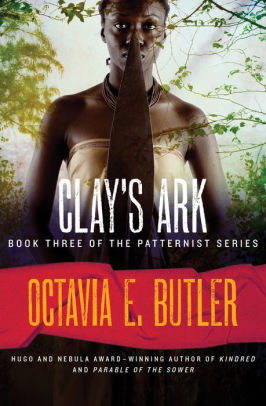

Clay’s Ark
Orlando, by Virginia Woolf
Her SF novel. Breezy, hilarious, and smart, with lots about writing and the writer’s life. And these immortal words about gender: “The change of sex, though it altered their future, did nothing whatever to alter their identity.” Woolf is a masterful satirist and teller of truth.
Buy the Book
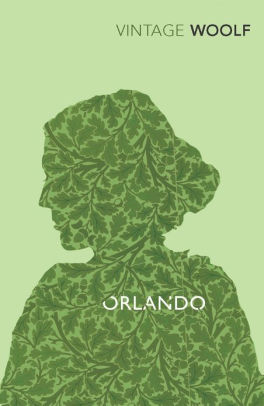

Orlando
Cassandra at the Wedding, by Dorothy Baker
A brilliant, beautifully written, psychologically astute novel about twins, loss, attempted suicide and…I won’t divulge the rest. With a brief but memorable appearance by a rarity in fiction: a sympathetic and very human psychiatrist. This is a book you’ll want to tell your friends about.
Buy the Book
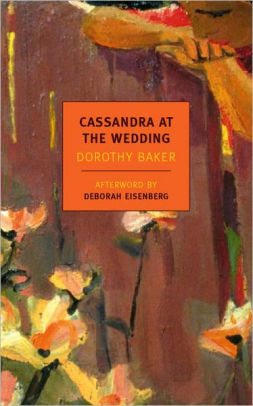

Cassandra at the Wedding
Pain: A Political History, by Keith Wailoo
The gripping story of pain and its treatment in the US from the 19th century to today. A master historian and storyteller, Wailoo examines our understanding of pain, our definition of pain, and our perception of pain through the decades. Shows the pendulum of treatment swinging back and forth, often holding whole groups hostage to misapprehension and prejudice. He pins today’s opioid crisis squarely where it belongs: on everyone. Big pharm, government, doctors, nurses, patients, pharmacists. How it did get so bad? Greed? Tunnel Vision? Deregulation? Put them together and what does it spell: free market capitalism.
Buy the Book
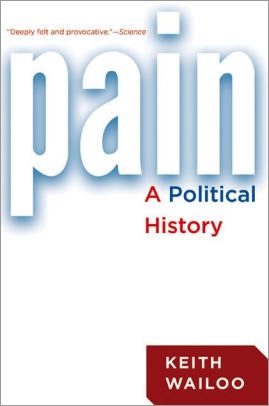

Pain: A Political History
Cosmic Biology, by Louis Neal Irwin and Dirk Schulze-Makuch
Subtitled “How Life Could Evolve on Other Worlds”, this is an expansive, detailed and thought-provoking book of hard science and imagination. It asks the key question: what is life? How can we define it? What are the common properties of living organisms on Earth? How do we distinguish living from non-living, when both share many of the same attributes? After tracing the evolution of life on Earth, the book takes off to other worlds in the solar system, considering the possibility of life on Mars, Venus, Europa, Titan, Io. And farther afield than that. What will life look like out there in the cosmos? Will it be carbon based and water based, as it is on Earth? Carbon is the most versatile atom in terms of building simple and complex molecules. But there are other atoms that can do the job. Water is unparalleled in bringing the ingredients of life—and living things themselves—together. But living things exist in waterless places. Perhaps extra-terrestrial life will be so different from us as to be unrecognizable. Perhaps we’ll be equally unrecognizable to it, or them. Cosmic Biology touches on all these topics, and more. It helped immeasurably in my writing of Longer. It’s a big book of ideas, but then, it’s a big universe.
Buy the Book
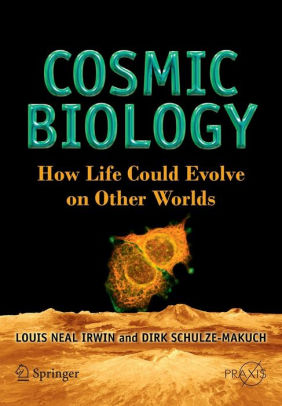

Cosmic Biology
These are the five I recommend today. Tomorrow there’ll be a whole new list.
Here’s a sneak preview:
- The Queen’s Gambit, by Walter Tevis. A troubled orphan finds her way, a prodigy comes of age, an addict gets straight. The early scene with the janitor in the basement kills me every time.
- The Chill, by Ross Macdonald. Sharp-eyed, humane, and relentless. The characters vibrate off the page. The ending is twisted and perfect.
- Calvin and Hobbes, by Bill Watterson. Consistently great. Any of the collections. All of them.
If Death doesn’t come in the night, I’ll give you the rest.
Michael Blumlein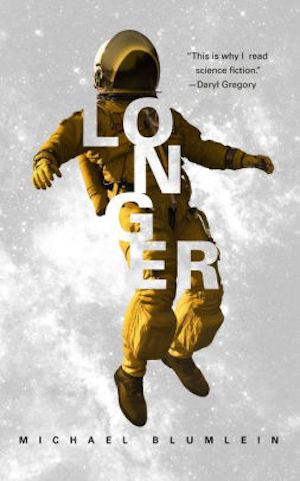 is the author of four novels and three story collections, including the award-winning The Brains of Rats. He has twice been a finalist for the World Fantasy Award and twice for the Bram Stoker. His story “Fidelity: A Primer” was short-listed for the Tiptree. He has written for both stage and film, including the award-winning independent film Decodings (included in the Biennial Exhibition of the Whitney Museum of American Art, and winner of the Special Jury Award of the SF International Film Festival). His novel X,Y was made into a feature-length movie. Until his recent retirement Dr. Blumlein taught and practiced medicine at the University of California in San Francisco. His novella Longer is available from Tor.com Publishing.
is the author of four novels and three story collections, including the award-winning The Brains of Rats. He has twice been a finalist for the World Fantasy Award and twice for the Bram Stoker. His story “Fidelity: A Primer” was short-listed for the Tiptree. He has written for both stage and film, including the award-winning independent film Decodings (included in the Biennial Exhibition of the Whitney Museum of American Art, and winner of the Special Jury Award of the SF International Film Festival). His novel X,Y was made into a feature-length movie. Until his recent retirement Dr. Blumlein taught and practiced medicine at the University of California in San Francisco. His novella Longer is available from Tor.com Publishing.










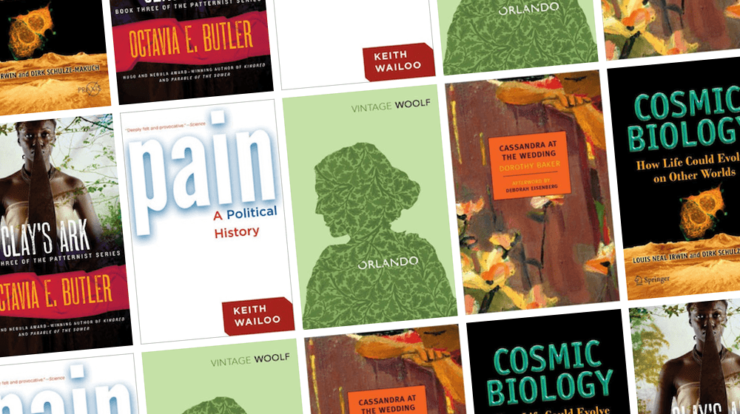
If death is on the line, one must read … a history of Sicily!
https://www.amazon.com/Sicily-Island-at-Crossroads-History-ebook/dp/B00RKO6N0U
A good romance does wonders because it’s about hope, love, and a belief in the future. I’ve had fan letters from readers who were sitting by the bedside of a dying loved one or facing grim health futures themselves, and they say that romance helps them deal. They have helped me in the same situation. The wife of a cousin dying from cancer had the HallMark Channel on constantly in his hospital room. Fluffy romance about cute couples, pets, and families helped her deal.
Good thoughts about your health problems.
I am currently dealing with cancer, with every hope of a full cure, but before I knew that the Wheel of Time helped me get through some really grisly waits for tests and appointments.
Michael, I remember meeting you, probably less than twenty years ago, and getting a signed copy of The Healer from you. I had already read and loved The Brains of Rats well before that. We only spoke for a few moments, but you were warm and generous. I enjoyed that book very much, and have tracked down your work and been much moved. I’ll read this new one (and the three on your list of recommendations here that I haven’t read), and my thoughts will be with you. I’m sorry as hell to hear this news, and wish like hell I could think of something useful to say. Peace.
When sitting by my dying father’s bedside, I read to him Jo Clifford’s play The Tree of Knowledge, which is about three Scots meeting in a kind of afterlife bubble in the Traverse Theatre to discuss their lives: and Erich Kastner’s glorious romp of a novel The 35th of May, which he had read himself as a boy and I had inherited from him.
My father was deeply unconscious and I’ll never know if he heard me, but those were the two books I wanted to share with him at the time.
I wish you all the best.
The book which, as I read it (twice so far), I thought most often, “This is a book I would read in hospice” is John Crowley’s most recent novel, Ka: Dar Oakley in the Ruin of Ymr. It’s a beautiful and elegiac novel, about death and the afterlife and crows. I imagined finding the point of view of Dar Oakley (the main character, the crow who first found his way — accidentally — from the realm of crows (Ka) into the realm of humans (Ymr)) very comforting. We’ll see if I still feel that way when the time comes. But I mention this in case it sounds to anyone like a book that might give them comfort too.
Very sorry to here your situation. I was diagnosed with stage iv lung last fall. For now, targeted therapy has my cancer on the retreat. Of course, without further developments that will be a temporary retreat.
I have a ton of half-read books to finish. But I am not quite at your stage yet. There is hope for me, no matter how slim, as advances in cancer treatments are rapidly being made. The diagnosis has only fueled my desire to publish my first novel and the first draft should be complete within a month.
What would I read in my final weeks? I can’t say. I too am not religious, though raised Catholic. I don’t rule out that consciousness continues in some way, though it doesn’t seem likely. Maybe I will seek books that encourage that thought? Hope is important just to make even the simple tasks of life more enjoyable.
Another consideration(a wild one, I admit): if some part of one’s being is to survive or somehow rekindle itself, isn’t voice a big part of that? If so, what kind of voice do we want to have? I am not one that believes that “voice” is something that you are born with and eventually becomes an unchanging part of who you are. When I read Dickens, his voice becomes a part of me. Or Hemingway. Or Neal Gaimon. When I write, I often pick up novels to read portions in order to help re-balance my voice back in the direction I want. Maybe I need more humor, so I pick up Fannie Flagg or Dickens even. Maybe I’m getting too wordy so I pick up Hemingway. Or maybe I just want that natural storytelling voice, so I pick up certain works of Stephen King. Maybe voice coud be a consideration as you choose. What type of voice do you want echoing and blending with your own as your consciousness prepares for a possible next journey.
I would go with something like Mort, by Terry Pratchett. Something that makes Death more funny and relateable. https://en.wikipedia.org/wiki/Mort
Very sorry to hear about your illness. I can relate as I’m in a similar situation. All told not sure as too how much time is left but am grateful for whatever is given.
Your comment about the spiral not stopping by itself rings all too true. The company of loved ones usually helps me forget even if it’s only for a moment.
Thank you for reminding me that books are the often ignored loved ones. They stand ready to comfort without fail and never ask for rest.
Godspeed good sir, may your path forward be what it needs to be.
In a situation like this I would probably read Road to Amapthea or Tale of the Tres. Strugatsky are a bit like Shakspeare – there is something for everybody.
Good health to all!
Virginia Woolf wins this one for me. I’ve tried reading her more serious musings and while totally in agreement as a bloke who treats women like humans I couldn’t continue what she had to write to the blockheads of her age. And today’s. So I shall try and got a hold of this one. Thanks for finding it
This is so thoughtful, and the comments also are moving. I have incurable cancer, with treatment on hold because of a heart operation for another problem. I have no idea how much longer I’ve got. I hope it’s years, but with cancer it’s hard to know. I read and read, but, like another of your readers I am also a writer. Often I find that writing my own stories is still the best way to escape. I often use a space pen, as I have tumours in my scalp and neck. I’ve been through phases of reading fantasy. Laini Taylor’s Strange the Dreamer is superb. Brandon Sanderson unputdownable. At present I’m reading more non-fiction, still desperately trying to understand the world I was born into…